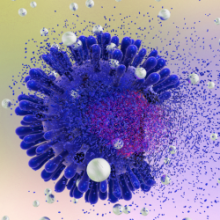HIV
HIV
 |
HIV stands for human immunodeficiency virus. Like all viruses, it replicates itself inside the human body and spreads. But HIV is particularly notorious because it targets the immune system’s master regulators, known as CD4 T-helper cells. These cells produce key signals that prompt other immune cells to swing into action – namely B-cells, which make antibodies and T-killer cells, which destroy cells infected with a virus. HIV paralyses the body’s immune defences and it does so without even needing to enter or kill the CD4 T-cells. Instead, it binds to them via an important molecule on their surface.
|
Cambridge groups and their work on HIV
Professor Andrew Lever Group (Department of Medicine)
The group are interested in aspects of the molecular and structural biology of HIV and are seeking new ways to combat this virus and to eradicate it.
Dr Mark Wills Group (Department of Medicine)
The group studies Cytomegalovirus Immune evasion. Cytomegalovirus (CMV) is responsible for the most common viral opportunistic infection in persons with acquired immunodeficiency virus syndrome (AIDS). Clinical disease due to CMV has been recognized in up to 40% of patients with advanced HIV disease.
CHERUB is one of the first cooperatives of UK Biomedical Research Centres to explore one of the most exciting new fields of biomedical research – HIV Cure. Professor Lever, Professor Gupta and Dr Mark Wills are on the scientific steering committee of Cherub. The group participated in developing a an AIDS garden for the Chelsea Flower show in 2018, reaching thosnads of members of the public.
Dr Ravi Gupta Group (Department of Medicine/ CITIID)
Dr Gupta focusses on host-pathogen and drug-pathogen interactions to inform HIV treatment and curative strategies. In particular, this includes in vitro HIV drug resistance to protease inhibitors and its implications for global scale up of antiretroviral therapy, and investigating the details of macrophage infection in clinical isolates. Eliminating the HIV reservoir (May 2019) Gates PhD student Isabella Ferreira, South Africa working for Ravi Gupta (2015).
Professor Jonathan Heeney Lab (Veterinary Medicine)
The Laboratory of Viral Zoonotics (LVZ) run by Heeney focuses on cross species transmission of viruses, and the co-evolution of viruses and their hosts including the evolution of immune mechanisms of disease, disease resistance and prevention.
Professor Simon Frost Group (Veterinary Medicine)
Frost’s research interests focus on the use of mathematical and statistical modeling to understanding the dynamics and evolution of infectious diseases such as HIV, hepatitis C and influenza A.
Dr Daniela de Angelis Group (MRC Biostatistics Unit) Dr Daniela De Angelis and colleagues at the Medical Research Council Biostatistics Unit, based at the University of Cambridge, use statistical methods to understand how diseases spread and how interventions impact them. Their novel approach to estimating the HIV burden is used to obtain UK official annual HIV prevalence estimates, which help inform national policy. See Devising and applying statistical methods to underpin national HIV policy and Statistical methods to influence HIV policy.
Professor Derek Smith Group (Zoology, Center for Pathogen Evolution)
Derek Smiths research interests span Evolution and population dynamics of antigenically variable pathogens, particularly influenza viruses but also malaria, HIV, and HCV.
News HIV
HIV remission achieved in second patient (March 2019, Gupta). Breakthrough in an alternative therapy to cure HIV against the backdrop of increasing resistance of HIV to drugs.
Yes, I cured a man of HIV, but now I need to pick up my daughter from school (Mar 2019, The Times, Gupta)
Study Clears Important hurdle towards HIV vaccine (September 2017, Heeney)
University of Cambridge research paves way for effective HIV vaccine (Oct 2017, Heeney)
Research reveals accidental making of ‘Patient Zero’ myth during 1980s AIDS crisis (Oct 2016, Dr Richard McKay, a Wellcome Trust Research Fellow from Cambridge’s Department of History and Philosophy of Science)
Cambridge diagnostic tool offers on-the-spot HIV testing to millions living with HIV in Africa (Jul 2014 ) Dr Helen Lee, Director of Research at the Department of Haematology, University of Cambridge and CEO of Diagnostics for the Real World.
Research recommends how to tackle spread of HIV/AIDS by African truckers (Oct 2013)
New target to fight HIV infection identified (Oct 2013, Chris Rudd, Department of Pathology) Scientists find mutant protein blocks HIV infection and transmission.
Offensive manoeuvres in the war against HIV (Feb 2013, Lever Group)
Breaking sex education taboos in Africa to tackle AIDS (Jun 2012)
Preventing HIV transmission during breastfeeding (Oct 2010, Stephen Gerrard, a PhD candidate at the Department of Chemical Engineering and Biotechnology)

